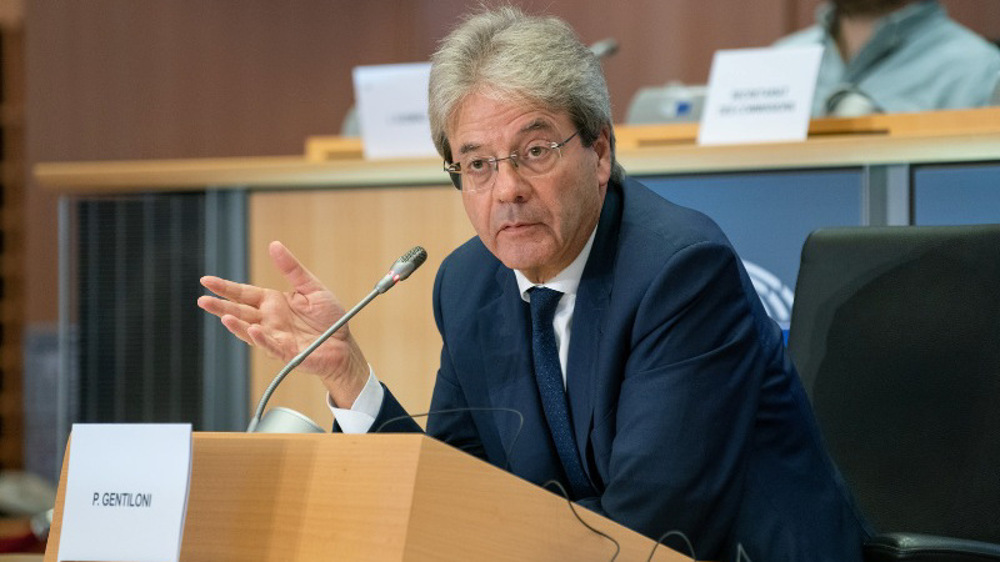EU Commission slashes bloc’s economic growth forecasts as war-stoked inflation soars
The European Commission has slashed the European Union’s economic growth forecasts as the ongoing Ukraine-Russia war fuels record-high inflation, which is continuing to destabilize the economy of the bloc’s member states.
The EU executive arm, which tracks the economy for the 27 member states of the bloc, announced Thursday that the gross domestic product in the eurozone would advance 2.6 percent in the current year and a sharply lowered 1.4 percent next year.
According to the commission, inflation will end at 7.6 percent, much higher than previously predicted, and 4.0 percent in 2023. However, this is still well above the European bloc’s target level of 2.0 percent and up from a previous forecast of 2.7 percent.
“The evolution of the war and the reliability of gas supplies are unknown, so this forecast is subject to a high degree of uncertainty and downside risks,” EU Economy Commissioner Paolo Gentiloni said at a press conference.
Russia launched military operations in Ukraine on February 24, with a declared goal of “demilitarizing” and “den-Nazifying” the ex-Soviet country.
Since the start of the offensive, the United States and its European allies have imposed unprecedented sanctions on Moscow and been dispatching large shipments of weapons to Ukraine, defying warnings from the Kremlin and some European observers that such moves would only prolong the war.
Russian President Vladimir Putin warned on May 12 that the West’s sanctions against Moscow would eventually backfire, stressing that “the continuation of the obsession with sanctions will inevitably lead to the most difficult consequences for the European Union.”
Elsewhere in its forecast, the European Commission said that the war in Ukraine had put “additional upward pressure” on energy and food prices, which were reducing the purchasing power of households.
One of the other factors having a negative impact on growth is the “faster than expected” tightening of monetary policy by the European Central Bank, which it says is needed to curb inflation.
Two other negative factors are the “continued deceleration of growth in the US” and the impact of Beijing's anti-Covid lockdowns, which have led to factory closures and depressed demand.
Furthermore, the commission estimated that the peak of inflation should be reached in the third quarter of this year and would then fall gradually to below 3.0 percent by the end of next year, as the consumer price inflation hit a new record high in the eurozone back in June, at 8.6 percent year-on-year.
The growth and inflation forecasts “depend heavily on the evolution of the war and in particular its implications for Europe's gas supply”, the commission further said, adding, “Further increases in gas prices could further raise inflation and stifle growth.”
On Wednesday, the International Monetary Fund (IMF) warned that Europe could plunge into recession as a result of the disruptions in natural gas supply triggered by the ongoing war in Ukraine.
IMF Managing Director Kristalina Georgieva said the current war in Ukraine had significantly darkened the economic outlook and that the US-based international financial institution was poised to downgrade its outlook for 2022 and 2023.
European countries like Germany, France, Italy, Hungary, the Netherlands, and others are dependent on Russian natural gas to generate electricity and heat for homes and to run their industries.
Furthermore, Russia is Europe’s biggest oil supplier, providing about one-quarter of the bloc’s yearly needs, according to 2020 data — about half of Russia’s total exports.
As the oil embargo is phased in, officials have said the bloc would seek to make up the shortfall by increasing imports from other sources, such as Persian Gulf countries, Nigeria, Kazakhstan and Azerbaijan.
D-8’s role in Iran’s economy after Cairo summit
China slams US as ‘war-addicted’ threat to global security
China ‘firmly opposes’ US military aid to Taiwan
VIDEO | Press TV's News Headlines
President Yoon Suk Yeol to be removed from office
At least 19 Gazans killed by Israeli airstrikes since dawn: Medics
Leader: Iran neither has nor needs proxy forces
US fighter aircraft shot down ‘in friendly fire’ amid aggression on Yemen










 This makes it easy to access the Press TV website
This makes it easy to access the Press TV website